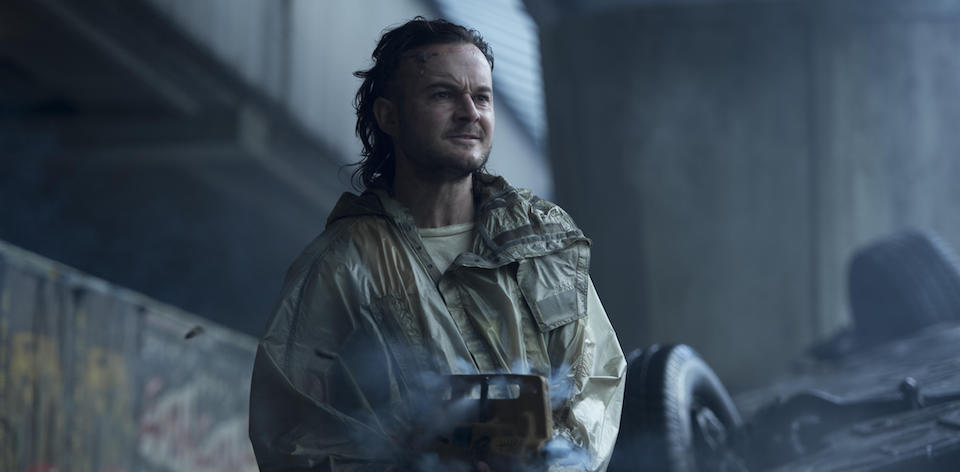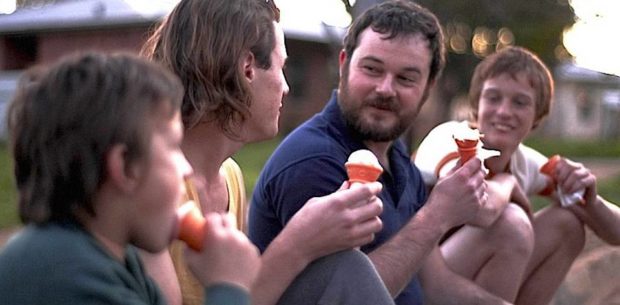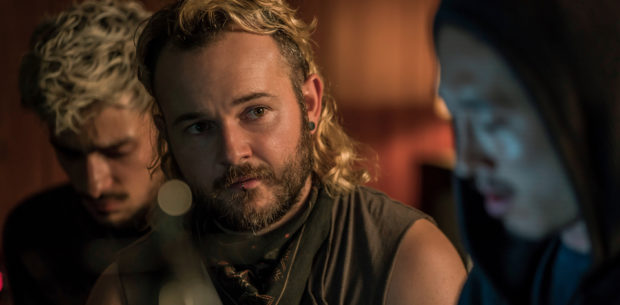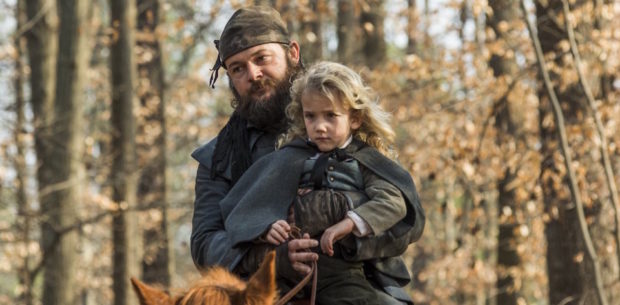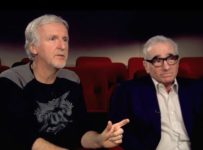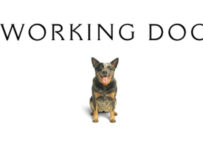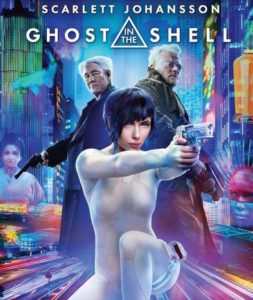 We last sat down with Australian actor Daniel Henshall over 5 years ago on the promotional tour for Any Questions for Ben? Since then, the Snowtown star has reached a bigger level of international acclaim, from the cult hit The Babadook to Okja.
We last sat down with Australian actor Daniel Henshall over 5 years ago on the promotional tour for Any Questions for Ben? Since then, the Snowtown star has reached a bigger level of international acclaim, from the cult hit The Babadook to Okja.
To celebrate the release of GHOST IN THE SHELL, available to own on digital today (July 12), Paramount gave us the opportunity to once again chat with Daniel once again. Portraying the Skinny Man, an amalgamation of several characters from Mamoru Oshii’s 1995 animated film.
We chat with Daniel about the making of the film, working with Bong Joon-ho on Okja, and the final season of TURN: Washington’s Spies, in which he plays Culper spy Caleb Brewster.
The last couple of years have seen you take on some increasingly international roles. Was there a point you noticed that trajectory turning?
Not so much, I think it’s been a slow build. I think being fortunate enough to be in a film like Snowtown and The Babadook, followed by an American job for an American television network, a body of work grows and more and more people come into contact with your work and are interested in potentially working with you. So you come on their radars, and you get that chance and, you know, sometimes it goes your way and sometimes it doesn’t. I’ve just been fortunate I think, my friend, there’s been a build since Snowtown. There hasn’t been one definite thing. That definitely put me on the right path, and I’ve been very lucky since then.
You mentioned Snowtown there a bit, and it’s certainly a role that a lot of people in Australia return to for you. Because of the nature of that role, a role like John Bunting, is it difficult for some casting people to get past do you think?
Again, I’ve been lucky enough to play varying roles since then and had the opportunity for them to see me in different lights. But yeah, definitely at the outset, in the beginning, in the aftermath of that film, for the first couple of years people did think of me as someone who could play that sort of darkness, someone who could play that character. So roles like that sort of came in my direction, but some other people along the way have given me a chance to express different parts and that’s been a real treat as well and a gift.
One of the reasons we’re talking today is the digital release of GHOST IN THE SHELL, which is about as polar opposite as you can get from that role. How did you first get involved in that film?
Well, I just went for an audition back here in Australia. I’d been going back and forth from the States for a show I’d been working on, went in like everybody else and put a test down for a casting agent in Sydney. The feedback was positive and it kind of went from there. Over the next couple of months, working out if the dates would work, and then an offer came out. It was a pretty normal process. The director and the producer has seen Snowtown. So I guess answering that question before wasn’t entirely true. I guess the turning point was obviously Snowtown, because I keep coming back to it. That’s definitely a reference point, as you said, for people here and internationally. It seems to stick in people’s minds.
That role that you played in GHOST IN THE SHELL is obviously a recreation of one of the most iconic scenes from the original, and an amalgamation of several characters. How familiar were you with that world before shooting?
I’d seen the original manga film and was duly impressed, and watched it again before going into the audition room and was impressed with how it hadn’t aged, and how scenes were incredibly mature. Personality, where does identity come from, the idea of self, gender bending, improvement, where we’re headed with AI, and all of that was definitely very influential for many filmmakers and films that have come since. So I was familiar with the film itself, but not the massive amounts of original content dating back to the late ’80s with the books, and the consequent television shows after the original film, and the second feature that came out in the early 2000s. So I wasn’t totally across it, but I was across the character, and as you say, the amalgamation of it from the original and the importance of that character within that world being a clear example of what was happening to people within that society, and how it was effecting that society.
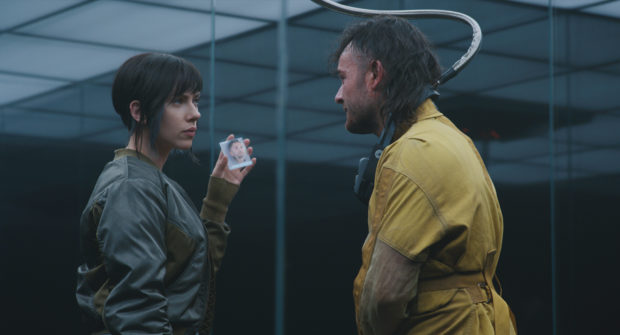
Daniel Henshall plays Skinny Man in Ghost in the Shell from Paramount Pictures and DreamWorks Pictures
Yeah, one of the distinctive things about that film was its distinctive visual look, and whenever I saw behind the scenes footage of you, you were surrounded by a wall of green. Of those scenes that you’re in, how different is it working within that purely visual effects driven environment?
Yeah, I’d started working in around green screens on a show I do in the States. That sort of introduced to me what it was like to work on something like that on that scale. Of course, it wasn’t on the same scale as GHOST IN THE SHELL. I was so focused on the stunts that it didn’t seem to affect me, you know. I had an idea of what the world was going to look like around me. That water-filled courtyard, in which that fight scene takes place in, I’d seen the images or visual representations and the director took me through that and showed me what was around me. The original film is such a classic, and iconic scene as you say, that you get a wonderful idea.
To be honest with you, I was so shit-scared of the stunts, because I was given the chance to attempt most of those stunts. What you see in the film is roughly 75-80% me, and the rest is a wonderful stunt performer finishing off the more difficult manoeuvres. So I worked on that for a week, and I felt pretty comfortable with that. So the only thing that I was focusing on was enacting what was happening to the character, and executing those stunts. So the green screen was just part of it, it didn’t affect me as much.
I can understand what it must be like working with dialogue with another actor or character that isn’t actually there, and being in an environment that isn’t actually there, and how distracting and how unreal or out of body that must feel. Whereas this was very physical. The water was real. The concrete was real, although it wasn’t actual concrete, it was added, but it felt and looked like it what it was meant to feel and look like.
The second scene that I do on that film is in a real set. So I had physical awareness of the world that I was in represented by the set. So it didn’t really affect me, to give you a really long-winded and convoluted answer, because I was so focused on what I was doing.
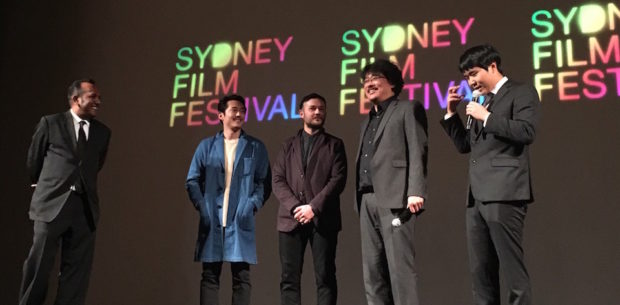
(L-R) Nashen Moodley, Steven Yeun, Henshall, and Bong Joon-ho at the 2017 Sydney Film Festival Closing Night. Photo Copyright © The Reel Bits.
The other thing you have been in, and another special effects film in a way, is OKJA, recently released on Netlflix. Now I was lucky to catch this at the Sydney Film Festival Closing Night.
Oh good one. You got to see it on the big screen.
Now, on stage, and I’m quoting you here, you said of the experience that you “fucking loved it.” Tell me a little bit about the experience of working with Bong Joon-ho.
Bong’s wonderful. He’s not only, as you experienced at the Sydney Film Festival, a very generous, insightful, and humourous and humble person, he’s just so meticulous and incredibly thought out. Every moment or frame, there is so much detail poured into. Working with that, in the beginning, was terrifying. He’s a guy who’s a perfectionist. He knows exactly what he wants and he goes about getting it from the outset, and you have to trust that you are able to fulfil those expectations. It doesn’t necessarily give you time to find it, and in the beginning that’s scary. You know from being a fan of his work that what he’s asking you to do is be spot-on and great, but to be able to fulfil it to the level that he would like is quite scary.
Then, of course, over time you get to know someone and they get to know you, and you get to trust them and trust in yourself. It became so exciting and freeing, knowing that you go to work, and you should be there, and he’s envisaged you feeling out those colours and levels and the physical nature of the character, and you own that. So whatever he’s asking you to do, it comes from you. It frees you, and that becomes really exciting and really joyful to do. You don’t often get that feeling on a set, of collaboration and trust and empowerment.
He’s such an inclusive director, and such a joy to work with, and the people he had cast, asking you to fill in the blanks he had asked you to fill in. Like a colouring book, I suppose. The outline is there, and he’s just asking you to shade it in the colours that he’s put there in front of you. How you do that, and where you put those colours, is up to you. You work together to find them, but once you do it’s fantastic. You know, there’s no pressure in the end, which is not often something that I feel. It’s nice not to have to feel no pressure and no responsibility.
It certainly sounds like a collaboration that you’d like to continue in the future.
Oh, if I had the chance, mate, I’d jump at it to work with him again. He’s a very unique filmmaker, and he makes quite diverse films varying in themes and styles. You’re working with someone who is a master of their art form, and it’s a privilege. We get along, which is a bonus, but I’d jump at it in a heartbeat.
You mentioned it a couple of times before, and of course TURN is currently screening its final season. Does working on a multi-year series like that open you up to a number of roles, and expose you to a larger audience as you say, but does it also limit what you can take on in terms of features?
During the time of shooting it, you wait until a certain part or time of the year before you can – and it’s champagne problems. I’m very fortunate to have this problem, for want of a better word. The show would shoot between October and March, so it would crossover, and you were committed to that. Then after it’s finished, the powers that be at AMC would decided whether they would renew it or not, and have a certain date to do that by. So you are contractually obliged to ask them if you’re allowed to take on any offers that are made in that time, up until they say yes or no to another season. You have to, sort of, keep at bay those offers that come during when the season might be.
So, because of that show I’ve missed out on a couple of jobs, but it’s a champagne problem to give up work for another job. It’s not one that most actors find themselves in, so I’ve been very fortunate over the last four or five years.
Fantastic. So what’s next for Daniel Henshall?
Good question, man. There are things bubbling away, nothing set in stone at this stage. We’ll see, we’ll see. There’s a couple of things on the boil, but nothing that I can speak about just at the minute. So I’m in a wonderful place. I feel very grateful that there is work out there for me, and interest, and there will be more of it to come. I can definitely trust in that and that’s a wonderful feeling.
We’d like to thank Daniel for generously giving his time to chat, and Paramount Pictures Australia and Nikstar PR for making it happen. GHOST IN THE SHELL is available to own on digital today(July 12) via paramountpicturesathome.com.au.

